Electric vehicle sales are falling in Europe, with VW seeing a 24% drop and Mercedes also experiencing a slump, with manufacturers blaming high inflation and rising energy costs
Sales of electric vehicles (EV) have fallen sharply in Europe. Volkswagen saw a 24 percent drop and Mercedes also saw a drop, as manufacturers blame high inflation and rising energy costs for the slump.
As drivers flock back to cheaper gasoline models, demand for battery-powered vehicles has waned and popular automakers are feeling the hit.
Volkswagen and Audi sell some of the most popular electric cars in Britain, including the Audi e-tron range and Volkswagen ID.
But recent data suggests demand for petrol in Britain is rising faster than electricity, amid concerns over price and charging infrastructure.
Car giant Mercedes-Benz also reported an eight percent drop in electric vehicle sales yesterday, blaming “the abrupt end of a tax stimulus” in Germany and the gradual phasing out of an electric model from its Smart brand.
Drivers are returning to petrol and diesel vehicles in droves amid concerns about electric car prices and charging infrastructure
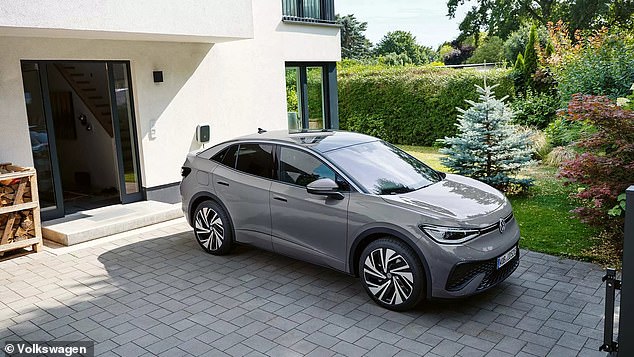
The electric Volkswagen ID is one of the most popular EVs in Britain
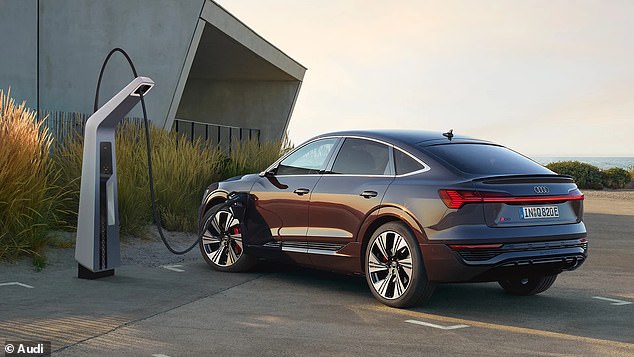
Audi’s e-tron series is also a popular model
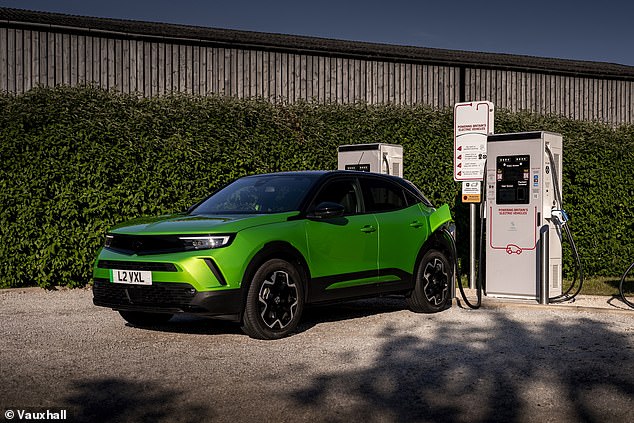
Vauxhall Stellantis have reversed their original plans to switch its best-selling city car to a fully electric car by 2027
Globally, sales of fully electric vehicles among owners of Audi, Skoda and Porsche fell by three percent to 136,400, while sales of cars with combustion engines rose by four percent to almost two million.
Aston Martin’s boss said yesterday it will continue making petrol cars until it is forced to stop by regulators due to subdued demand for electric cars.
The company also postponed the launch of its first battery vehicle from 2025 to 2026 due to the rapid decline in demand.
Chairman Lawrence Stroll said there will ‘always’ be demand for sports cars with petrol engines, such as the V8 and V12 models.
Like its rivals, the 111-year-old manufacturer will face a ban on new petrol or diesel cars in Britain from 2035.
But Stroll has stated that his company will not give up on gas-guzzling vehicles until it is absolutely necessary.
‘We’ll keep making them as long as we’re allowed to make them. There will always be demand, even if it will decrease,” the billionaire sports car maker said.
He also claimed that the push for electric cars had more to do with ‘hype’ than with real and current consumer demand.
His comments are in stark contrast to competitors such as Jaguar and Rolls-Royce, which have pledged to be fully electric within six years.
Stellantis, the car manufacturer of Peugeot, Vauxhall and Maserati, among others, also followed with Stroll.
It stated that it would extend production of its popular gasoline-powered Fiat Panda until 2030 to meet demand.
But the turnaround comes after the company made initial plans to switch its best-selling city car to a fully electric car by 2027.
The fall in demand for electric cars comes as politicians in Britain roll back subsidies and reconsider ambitious targets to ditch petrol and diesel vehicles.
In September, British Prime Minister Rishi Sunak postponed a deadline to block sales of new petrol and diesel in Britain from 20130 to 2035.
In 2022, incentives for drivers purchasing new electric vehicles were removed.
According to figures from the Society of Motor Manufacturers and Traders last week, registrations of electric vehicles were up just 3.8 percent last month on a year earlier, while sales of petrol engines rose 9.2 percent.
But even as demand for petrol cars increases, EU officials are deciding whether to introduce a similar ban on petrol and diesel cars to make way for the use of synthetic fuels that can power an internal combustion engine.
Manufacturers such as Volkswagen and Mercedes are feeling the pressure on their EV sales as carmakers across Europe face increasing competition.
Chinese-made electric vehicles – including brands like BYD – offer battery-powered cars that are significantly cheaper than Western rivals.
A Bloomberg investigation found that experts from Germany’s Kiel Institute estimate that BYD has received more than £2.9 billion in subsidies in recent years.
“Chinese carmakers have become predatory in their own domestic market,” said Matthias Schmidt, an independent auto analyst.
‘To maintain market share, Western car manufacturers also have to lower prices.’
Nearly every model made by BYD has had its retail price slashed, accompanied by the slogan “electricity is cheaper than oil” – as a price war continues to rage in China, the world’s largest EV market.
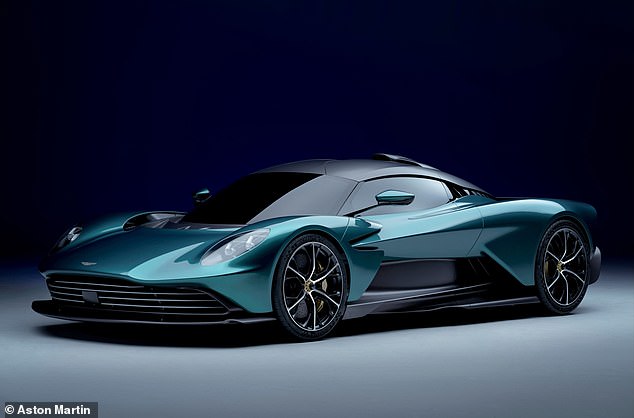
Aston Martin has postponed the release of the battery-powered vehicle from 2025 to 2026. The company still plans to deliver its first plug-in hybrid supercar, the Valhalla (pictured), later this year.
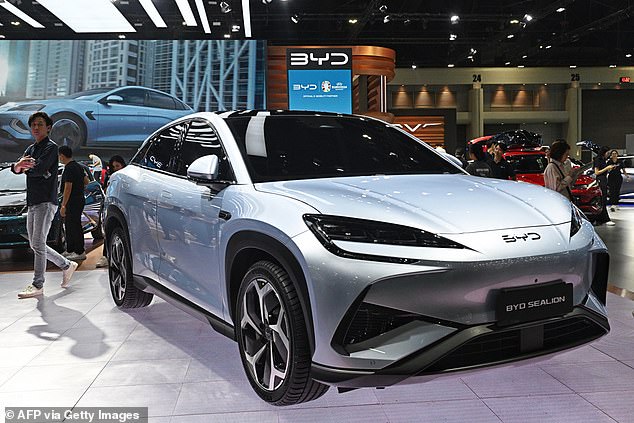
Chinese-made electric vehicles – including brands like BYD – offer battery-powered cars that are significantly cheaper than Western rivals
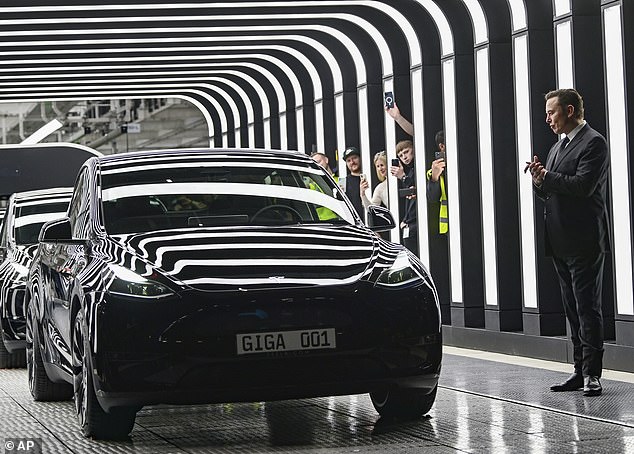
Several major car manufacturers, including EV market leader Tesla, have withdrawn their investments
It comes after Tesla sales fell by more than seven percent at the start of the month after the company reported its first year-on-year sales decline since 2020.
The world’s most valuable automaker delivered 386,810 vehicles in the first three months of the year, down 20 percent from the previous quarter and nearly nine percent from the same period in 2023.
In February, Apple also canceled work on its electric car project called Titan.
Apple’s electric car has been in the planning stages since 2014, and during that period rumors arose about what it would entail.
Although the original plans were to create a fully autonomous vehicle, the plans were eventually scaled back.
Executives were also reportedly concerned that at the $100,000 target price, profit margins would be dangerously small.
But not all manufacturers are struggling.
BMW announced yesterday that sales of electric vehicles increased by as much as 28 percent in the first three months of the year.
